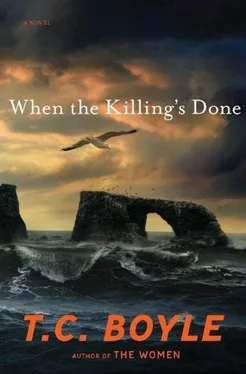Of course, that’s all just a dream, an adolescent fantasy. Everything, every square foot of everyplace, belongs to somebody, and any contemporary wild man — or entertainment center magnate with the flicker of an idea of even thinking about going wild — would be hunted down and hustled off to the bughouse in padded restraints. He’s reflecting on that, on wildness, on peace and eternity and the natural state of man, as they round Coche Point and motor close in along the coruscating arc of China Beach, using the headland behind them as a screen in the event that the Coast Guard cutter does in fact get word and come looking for them, and between bites of his sandwich he turns to Rita to see what she has to say about it. “Did you ever hear any stories about the wild man that used to live out here?” He chews, swallows, picturing himself in a loincloth and shaking a spear over his head. “Years ago, I mean. Turn of the century?”
She considers a moment, her eyes drifting off to some other destination before sharpening with the recollection. “Francisco used to talk about him,” she says, hunched forward over her knees, beer can in one hand, half-eaten sandwich in the other, her head gently swaying with the movement of the boat. “It was like a legend or something, only real. This was in the early days, by the way, back before Prohibition when they had the winery going and all that. His father — Francisco’s father — told him the guy was a poacher, stealing sheep to eat what he could of and leave the rest for the ravens.”
“He wasn’t right in the head, was that it? I mean, sucking gull’s eggs and sleeping out in the open and all the rest of it, the loincloth—”
“He was a Dane, but the shortest Dane on record — only five feet tall. Or that’s what they say. And not only was he poaching sheep, he killed foxes, skunks, the island blue jay, whatever he could get hold of, and, I guess, just cooked it over a driftwood fire and dug in.”
“Roast pork,” he says automatically, and he means to be funny, or at least ironic, but he can’t bring himself to grin or even smile because the thought sets him off all over again. They’re out there now , he thinks, blowing away animals. And we’re laughing about it . In the distance he can make out the pier at Prisoners’, a strip of nothing out there in the sun glaze, but no boats at least. And no helicopters.
“So he was a carnivore,” Anise puts in, and she’s wearing a sour grin, needling her mother. “Just like you, Mom.”
Rita grins back at her, then digs in her breast pocket for a pair of opaque iridescent blue sunglasses and claps them over her eyes as if she’s going into hiding. “That’s right,” she says, “because that’s the way we were made.” She pauses to take a sip of her beer. “And I just love the taste of lamb.”
“Yeah,” Anise says, the grin gone now, “and meat is murder.”
“I think I’ve heard that one before.”
“Well, it is.”
“You didn’t seem to feel that way when we were living at the ranch.”
“Come on, I was just a child. I didn’t know any better.” She’s fixed on her mother now, twin creases of irritation emerging between her eyes. “But you should. After what we saw out there, I mean just that one day with the ravens and those hunters? You might not have known it, but that was the biggest trauma of my life—”
“That and Oxnard Junior High.”
“I’m not joking. I’m telling you: animals are conscious. They feel pain. They have the same right to life you have.”
“I remember one time”—Rita says, ignoring the appeal and lifting one dripping boot to brace an ankle on her knee before settling back in her seat with a sigh—“during shearing, when those vaqueros came out and raised a little hell after all the wool was in and they roasted a kid — the head, remember that? They put the head right on the coals and then split it open for the brains—”
“I don’t want to hear it.”
“—and that good rich creamy pale fat you used to spread on a slice of oven-hot bread like it was butter. Did you know that, Dave? Anise used to be a regular little mutton glutton.”
“Yeah, well, me too,” he says, trying to play peacemaker. “Until I saw the light. But anyway, you know we’ve got to stop this pig hunt — I mean, it’s crazy. Nobody, not even the guy that runs the slaughterhouse, would want to see animals hunted down for nothing. Or you either, right?”
What he’s trying to ask is whether she’s on their side or not, but Anise jumps in to answer for her: “No, no way. She’s as opposed to it as we are. Anybody would be.”
They’re both looking to her, the harbor running up on them, waves creaming along the shore and the chaparral above it patchy and parched and waiting for the rains, when she sets down the beer in the cup holder in front of her and raises her head to level a savage uncompromising glare first on him and then her daughter. “Of course I am,” she says, spitting out the words. “It’s a waste of good meat.”
That night, after taking them both out for a very pricey dress-up dinner at a new French restaurant Anise seemed to have heard about somewhere, during which he got into an unfortunate debate with the waiter over the way his sole meunière had been prepared, which he’d had to send back twice, Anise clucking over the fate of the fish—“If you’re going to commit to vegetarianism you can’t go halfway, Dave, because that’s just cowardly”—and Rita giving him a sour smile while lifting dainty slices of all-but-raw filet mignon to her lips, he drops them off at Anise’s apartment without comment and drives home to inspect the new lawn. And if he drives too fast and if a cop he vaguely recognizes pulls him over and asks him how much he’s had to drink and does he know the speed limit on city streets is thirty-five miles an hour and lets him off with a warning, it’s all because the day has been, well, complicated. He’s tracing the chain of events that blasted his mood to fragments — the frustration at Prisoners’ Harbor when the helicopter appeared out of nowhere to buzz the boat till he swung round and nosed it out to sea, the blaring circumambient voice warning him that “THE ISLAND IS CLOSED TO ALL VISITORS, REPEAT, THE ISLAND IS CLOSED,” Anise taking so long to get dressed they missed their reservation by forty-five minutes and had to prostrate themselves before a little frog bastard of a snooty maître d’ before they got seated, and then the waiter, and the fish and the way Rita sucked at her filet mignon as if she were draining it of blood drop by drop — when the gate pulls back and he glides into the driveway to the streaming welcome of the motion-sensor light mounted over the garage door.
It’s past midnight. He’s tired. He’s aggravated. He’s not thinking deeply. The car door eases open, the radio dies on a jam from some anonymous band he must have heard ten thousand times, and why, in Christ’s name, can’t the programmers come up with something different, something obscure and new and unfamiliar, the B sides, nothing but B sides, just to give everybody a break before they go out and shoot themselves? He steps out on the firm hardscape of the cobbled brick drive, feeling the familiar boater’s illusion that the ground is moving beneath him. For a moment he just stands there, taking in the night chill, the stars, listening to the silence and the muffled drone of the freeway. And then, just as he’s about to dig a flashlight out of the trunk and stroll out onto the lush new yielding carpet of the turf, to admire it and congratulate himself on his decision to go with sod instead of scattering grass seed and worrying over birds and weeds and bald patches till it comes in, he becomes aware of movement there, out along the perimeter of the yard.
Читать дальше












